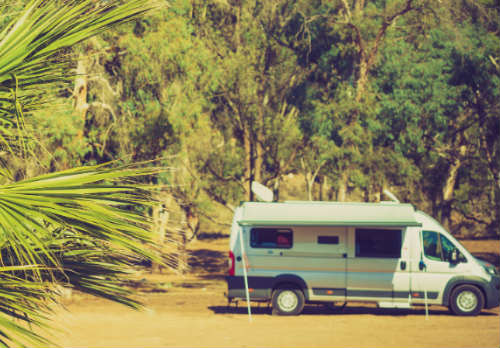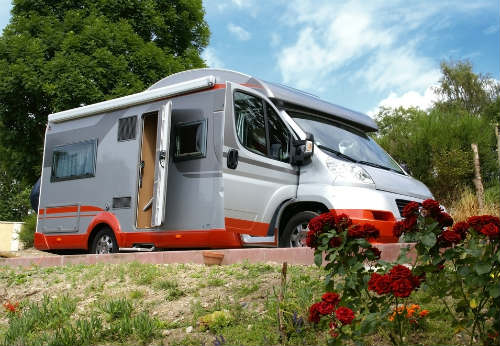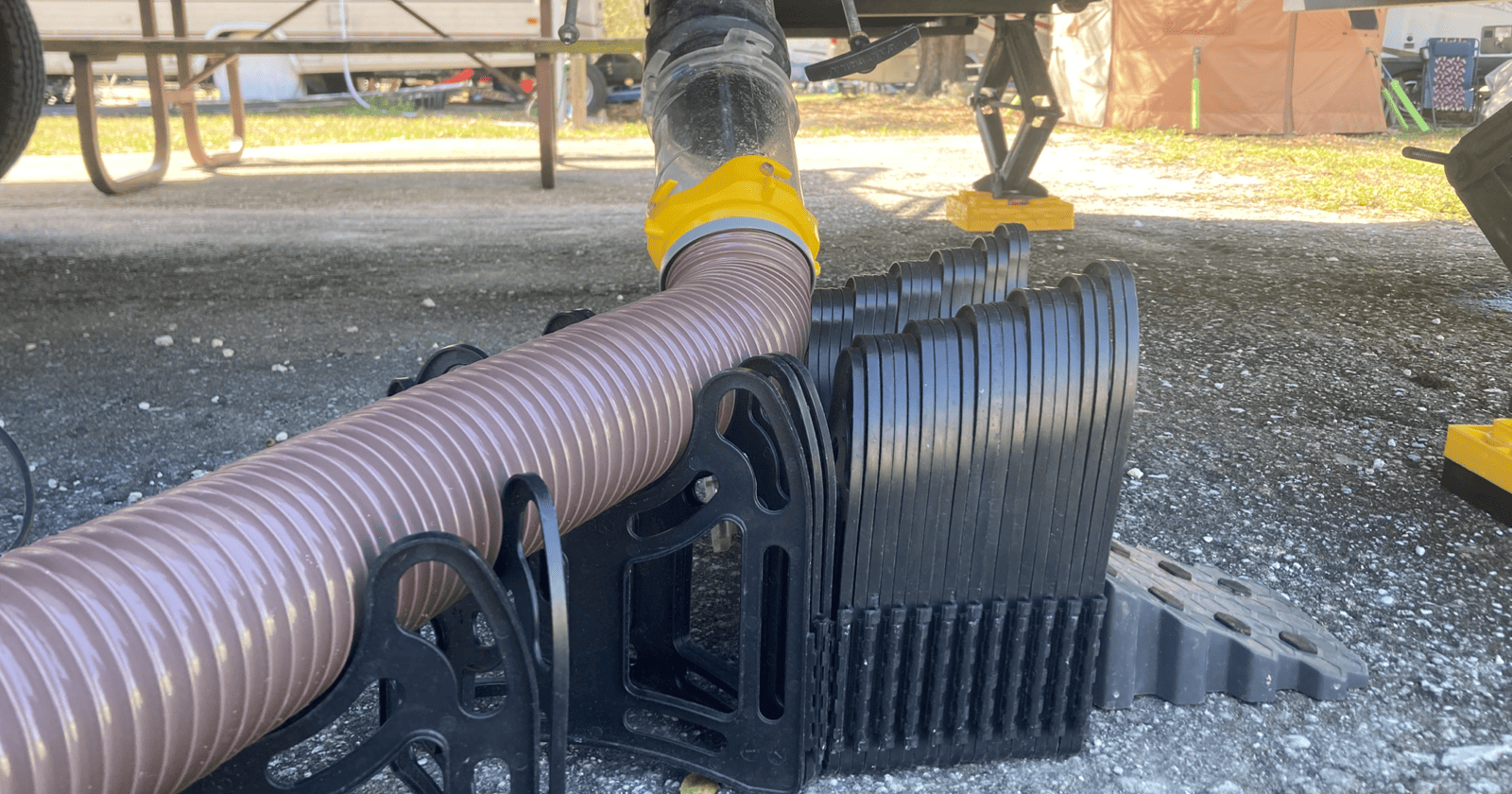Stealth camper vans are a sub-type of the Class B motorhome. Many who live the van life are starting to see the advantages of this off-grid camper van lifestyle. What is this covert camper van and does it come with a secret spy decoder ring?
You’ve seen those movies and TV shows where the spy or strike force team are running through their operation and there’s always those “guys in the van.” They’re the ones sitting on office chairs in front of computers with headsets relaying information to the team. These vans can be comically obvious as spy vans.
In the movie, True Lies, Tom Arnold’s character Albert Gibson says, “I’m sick of being in the van. You guys are going to be in the van next time. I’ve been in the van for 15 years…”
Stealth camper van conversions are very different. This type of van Tom Arnold’s character would love to be in. Instead of a mobile command center, its an RV with many comfortable amenities seen in Class B motorhomes. The differences between a stealth camper van and typical class B is skin deep.
For this topic, we’re going to expose the truth of what defines a stealth camper van RV. If you want one of your own, we’ll showcase the options available. Finally, we’ll crack open the legal truths of living the stealth class B lifestyle.
What Is a Stealth Camper Van

Traditional Class B motorhomes are built on cargo van chassis. RV manufacturers may add a taller roof or extended back end to increase interior space. They also add exterior storage bays, running boards, and other external features to add to the camping experience. The Pleasure-Way Tofino has a hybrid loft that extends from the roof to add sleeping space.
To answer the question, what is a stealth camper van, you have to strip away all of those extra exterior features an RV maker would add. To an outside observer, it looks like a normal cargo van on any city, suburb, or rural street. There is no indication it’s used for camping.
Stealth camper vans aren’t suped-up passenger vans. A van conversion isn’t an RV. Conversion vans are passenger vans with added luxuries made in combination with car manufacturers and a third party. They are not meant to be lived in.
Camper vans as a whole are another way to live the downsized lifestyle. They are easy to drive, park, and experience the world we live in. The people that choose this life also enjoy the stealth experience for the added safety, because it doesn’t draw unwanted attention.
Many stealth camping folks will repaint used vans a solid color to cover up any previous signage that faded into the previous paint. There are tinted side windows or none at all. The goal is to be dismissed as a typical vehicle.
There are some companies that build custom stealth camper vans, but generally, most are individually built. The advantage is the relatively inexpensive cost to design and build a motorcoach the way you want it. There is a lot of freedom in the features you want because these vans can handle a lot of weight.
People like this type of camping for its versatility. It works for urban and rural camping environments. Compared to other drivables, it can be a more fuel-efficient way of living the RV lifestyle.
Van Models That Work Well
For the 2020 production year, there are many cargo vans you can choose from. You can go with the more narrow and taller European styles that Ford, Mercedes, Dodge, and Nissan offers. Another option is the wider American styles that Chevy and GMC build.
Below is a list of the full-size models that make good stealth camper vans. Many have smaller city versions. If you want the most interior space available, full-size is the best van to live in.
- Ford Transit Cargo Van MSRP starting at $34,510
- Mercedes-Benz Sprinter Cargo Van 1500 MSRP starting at $33,790
- Dodge Ram ProMaster Cargo Van 1500 MSRP starting at $30.895
- Nissan NV1500 S V6 Cargo MSRP starting at $29,890
- Chevrolet 2500 Express Cargo MSRP Starting at $32,000
- GMC Savana RWD 2500 Regular Wheelbase MSRP starting at $33,095
Buying Used Vans

Cargo vans are built very well. The average van has a life span of 250,000 miles or more as long as they are maintained. Buying one that’s five years old with 100,000 miles could cost a third of a new one.
You could use these savings to enhance your interior build or keep it for your future travels. This is one of the many advantages of do-it-yourself projects. You have the freedom to build it your way.
Buying a Rental or Lease
A little known fact is how vehicle rental companies and bigger service companies get their vans. Instead of buying them outright, they sign fleet lease agreements directly with carmakers directly. After the vehicles have reached the set time or mileage, they are required to return the vehicle to the manufacturer.
For example, let’s say Hertz Car Rental signs an agreement with Ford for 10 million cargo vans. The agreement states that Hertz will return each van after 2 years or 30,000 miles, whichever comes first. As long as the van meets the proper maintenance and interior conditions, Ford will accept the van back.
Once Ford has the van, they send it to one of their dealers to sell it as a used vehicle. If the van doesn’t meet the high standards, usually due to the interior having too much wear and tear, Hertz has to keep it. Hertz will continue to rent it out, or send it to their sales lot.
Since Hertz has to keep the van, they have to pay Ford the value of the vehicle. For a buyer, these vehicles are well maintained and have a price tag that can be advantageous. You could purchase a van that is in great shape mechanically for a great price.
Maintaining Your Van
Maintaining vans are relatively low. Car manufacturers build these vehicles knowing that they are going to be used by commercial or industrial companies. The vans will have to endure heavy loads, have long run times, and handle other stress most passenger vehicles can’t.
They are also heavily mass-produced. Most repair shops have parts in stock or know how to get the parts quickly. The parts themselves are standardized rather than specialty, so costs aren’t tremendous. If you’re concerned, and your vehicle still qualifies, you may be able to purchase an extended warranty.
When you travel outside urban areas, you may want to do your homework when it comes to repairing options. Some RVers had more difficult experiences locating repair shops on the road that could repair their automotive issues. This was due to some shops not having the proper equipment to repair certain import brands.
Having a discussion with your RV insurance company is a good place to start. Checking out the various RV forum can help as well. No one expects you to be an expert, but knowing what to expect is the best way to prepare if you do have a breakdown.
Planning Your Build

Before you grab your power tools, you’ll want to grab a pencil, paper, and a measuring tape. You want to plan everything out first. You need to determine what you want to put in your camper van, where it’s going to go, and if it’s going to fit.
Start with these questions:
- How many people and/or pets are going to be with you?
- What amenities are absolutely essential? (be honest, if you can’t live without your TV and game console, plan for it)
- How are you going to store and generate electricity?
- Where are you going to store your clothes, food, water, and other essentials?
- What features can be made to serve dual purposes? (can your bed have storage underneath it?)
- How do you shower when you live in a van or take care of other hygienic needs?
- How are you going to handle your mail and internet?
- Make sure the weight is evenly distributed throughout the van
- How are you going to keep yourself warm/cool when the engine is off?
The list goes on, but these questions need answers. Not all of them directly deal with building your stealth camper van, but if you are going to live the full-time RV life, you have to plan everything. For the logistics things, check out the Camper Smarts website for many tips and tricks to aid you on your new van lifestyle.
Ventilation
For ventilation, there are low profile vents you can install to draw in fresh air. Some have electric fans that are bi-directional. Experienced RVers will tell you that opening the right combination of windows will create a wind tunnel in your coach to create a breeze. To keep the stealth, you don’t have to open the vent too much.
Electric Power
There are two types of solar panels. For our purposes, to keep your van camouflaged, you can attach flexible solar panels directly to the roof. They won’t be seen, and they can charge your house batteries for your electric needs.
These 100 to 160-watt panels can keep your battery bank charged, but you will want to learn all you can about how solar systems work. Your capabilities will be limited, but manageable. You can learn more about solar systems in our discussions about them.
If you don’t want to go solar, you could connect your batteries to an alternator to recharge your bank. This would require running your engine for a while. If you plan on taking long trips, this may work out for you.
Generators or having a power cable that connects to shore power hookups would work as well. The generator fulfills the off-grid van life feature but the noise and exhaust will blow your cover. Shore power lines are also dead giveaways and only work for specific hookups that are difficult to find in city environments.
Hygiene
Getting used to not showering every day is something many RV and van lifestyle folks adapt to. When you need to use the restroom, you just have to go. There are many options you can choose from.
Major highways have rest areas you can use at no cost. National chain truck stops like Pilot/Flying J, Loves, and TA-Petro not only have restrooms but clean showers that are maintained after each use.
National and state parks have yearly-passes you can buy that give you discount rates on campgrounds. You can use their facilities if you want to treat yourself to a night of natural serenity. Bring a fishing pole with you to have a chance for a fresh fish dinner too.
Another option is to pick up a portable toilet and camping shower. They are small and easy to store. The holding tanks on the toilets are still big enough to be used multiple times if you can’t immediately find a dump station facility to dispose of the contents.
How to Pick Locations for Stealth Camping
Many ask if stealth camping is illegal. It’s legal if you do it correctly. We’ll discuss legalities in a moment, but here are some van dwelling and RV tricks that you can use.
In the traditional RV world, staying overnight in a parking lot is called boondocking. This is where you pull in for the night, get some sleep, and pull out in the morning. There are some rules and courtesies you should be aware of.
Park in the back or the outer edges to allow regular customers the closer spaces. Keep your area clean and quiet. If you can, go in and buy something as a way to say thank you.
These are the businesses that usually offer boondocking. Before you park, look for signs that prevent boondocking. Some of these businesses don’t own their parking lots, so they don’t have control of the parking lot rules:
- Walmart
- Cabelas
- Bass Pro Shop
- Cracker Barrel
- Home Depot
- Lowes
There are websites like Campendium that can help you find free camping locations across the country. You can also check the Bureau of Land Management (BLM) which is apart of the federal Department of Interior. Each state has it’s own version that you can find within their website.
Stealth Urban Camping

As a stealth camper van, you are camouflaged to look like an ordinary van. White vans have the best chance of blending in as service vehicles. Grey or black works well too. Any other color could get you noticed in urban environments more often.
Parking in commercial or industrial areas around other service vehicles will make you look like a needle in a stack of needles. Public parking structures are a possibility, but many of them have overnight fees that can add up. The structures may also have rules against sleeping in your vehicle.
Other places like small businesses, religious/community centers, and other places you’ll want to ask permission first. Avoid places that monitor their parking lots often. Schools, utility stations, hospitals, and government buildings don’t like uninvited guests.
If you need to stay in a certain area, rotating is key. Staying in one place, especially the same parking space is the best way to draw unwanted attention. What you could do is connect with someone in the area and see if you can use their property to dry camp properly. It may not be stealthy, but the best part of camping is meeting new people and you’ll be safer.
Legalities and the Police
We’ve been dancing around the idea of whether the stealth van life is legal. It is with certain exceptions. There are certain cities that have ordinances banning it. Many of these laws have helped reduce homeless and crime issues that have overwhelmed cities.
Going online and learning local regulations are the best way to keep yourself out of trouble. You’ll also want to keep your van in as good of shape as possible. Keep the inside and out clean and tidy.
When the police patrol, they are looking for potential concerns. A rusted van with faded signs that has garbage on the dashboard is a red flag to them. Remember though, this is your home, so we’re sure you’re going to take pride in it anyway.
If a police officer does knock on your door, keep your cool. They just want to know everything is okay. They are paid to be curious. Stay calm, tell them the truth, and follow their instructions.
Remember, they are looking for potential trouble. Even in your pajamas, “RV chic” is very different than “homeless hip” or “bad guy grunge.” If you’re a blogger, this may be a great post afterward.
Giving the Stealth Van Life a Try
Are you curious about this type of RV living? RV rental services like Outdoorsy allow you to rent this and other types of RVs all across the country. What’s great about this service is the ability to learn about who you are renting from and experiencing what a real RV is like. These coaches are owned by real people, not a fleet service.
By renting an RV, you have the ability to try it out before you make the investment. Since stealth camper vans are mostly D.I.Y. projects, you can rent a few of them and traditional class B RVs to inspire your build. When you meet up with the people you’re renting from, that’s your opportunity to ask them as many questions as you can about their building experience.




